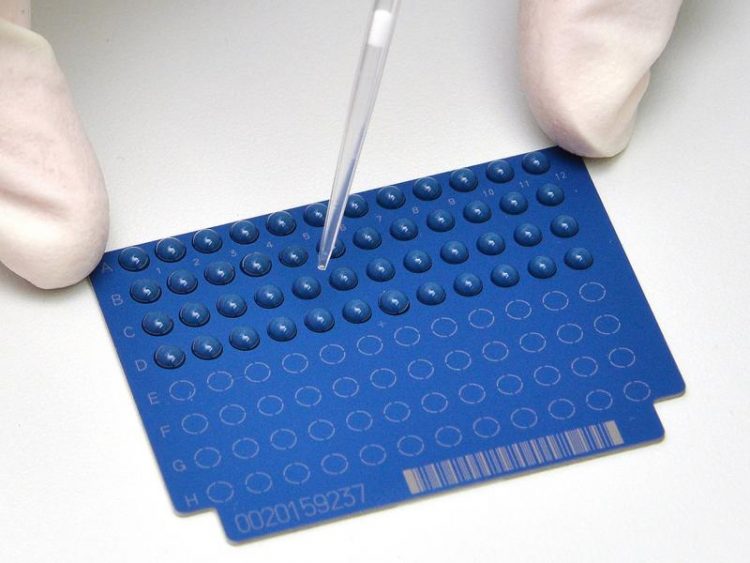Microbiologists develop a novel method for rapid detection of antibiotic resistance

Symbolic picture: Application of microdroplets for rapid determination of resistance using MALDI-TOF mass spectrometry photo: FZ / E. Deiters-Keul
Respiratory, urinary tract, wound infections, and sepsis: the list of sites in which severe and life-threatening diseases manifest as a result of multidrug resistant microorganisms is long. The best option is an antibiotic treatment targeted specifically to the detected pathogen. However, the identification of microorganisms and their resistances to antibiotics is time consuming.
A research team from the Institute of Medical Microbiology, University of Münster, Germany, has developed a method that considerably accelerates resistance testing. Supported by the German Federal Ministry of Education and Research (BMBF), and in cooperation with an industrial partner, the research team is currently developing this method. Soon to be on the market, it will be readily available for patient management.
The novel method proposed by project leaders Evgeny A. Idelevich, M.D. and Karsten Becker, M.D. is based on MALDI-TOF mass spectrometry, which was recently introduced for microbial identification. Prof. Becker observed, “We also need new techniques for more expedient detection of acquired antibiotic resistance”.
Currently applied methods require more than 24 hours, as they are dependent on bacterial growth. The innovative method from Münster would allow earlier optimization of patient treatment and the prompt initiation of infection control measures, crucial for the protection of hospital patients from a spread of multidrug resistant bacteria.
Currently, many physicians administer broad-spectrum antibiotics to swiftly provide a reliable medicine. Unfortunately, microorganisms can become resistant due to this very treatment. The shift to a more targeted antibiotic therapy reduces antibiotic selection pressure and thus, the emergence of multiresistant bacteria.
Dr. Idelevich added, “The application of MALDI-TOF mass spectrometry for resistance testing was attractive to our research due to its expediency and high accuracy. It can also be optimally combined with the identification process, rendering it cost-efficient”.
Based on this technology, both researchers have developed a rapid and universal method for resistance determination which is independent from the underlying resistance mechanisms and can be performed simultaneously for multiple antibiotics. Through the license agreement with Bruker Daltonik (Bremen, Germany), a pioneer in mass spectrometry technologies, this innovative method can now be developed further and optimized for the diagnostic market.
Prof. Becker commented, “We hope that our method will be available for routine use in clinical laboratories in 2-3 years”. Here in Münster, we are particularly proud of the MALDI-TOF mass spectrometry project, as the MALDI-TOF technology was greatly influenced in the 1980s by Münster scientists. At that time, the groundwork was established for today’s microbial identification. Currently, thousands of laboratories worldwide already use a MALDI-TOF instrument. This sets optimal preconditions for the wide-spread and cost-efficient implementation of our method.”
The cooperation between academic and industrial institutions in Münster and Bremen will be supported by the BMBF for an additional three years; a grant totaling more than 900,000 Euros was awarded to the academic and industrial partners.
Media contact:
Dr. Thomas Bauer
Referent Research and Teaching at Münster University Medical Faculty
phone: 0251-83-58937
mobile: 0171-4948979
email: thbauer@uni-muenster.de
Media Contact
More Information:
https://www.uni-muenster.de/All latest news from the category: Health and Medicine
This subject area encompasses research and studies in the field of human medicine.
Among the wide-ranging list of topics covered here are anesthesiology, anatomy, surgery, human genetics, hygiene and environmental medicine, internal medicine, neurology, pharmacology, physiology, urology and dental medicine.
Newest articles

Trotting robots reveal emergence of animal gait transitions
A four-legged robot trained with machine learning by EPFL researchers has learned to avoid falls by spontaneously switching between walking, trotting, and pronking – a milestone for roboticists as well…

Innovation promises to prevent power pole-top fires
Engineers in Australia have found a new way to make power-pole insulators resistant to fire and electrical sparking, promising to prevent dangerous pole-top fires and reduce blackouts. Pole-top fires pose…

Possible alternative to antibiotics produced by bacteria
Antibacterial substance from staphylococci discovered with new mechanism of action against natural competitors. Many bacteria produce substances to gain an advantage over competitors in their highly competitive natural environment. Researchers…





















